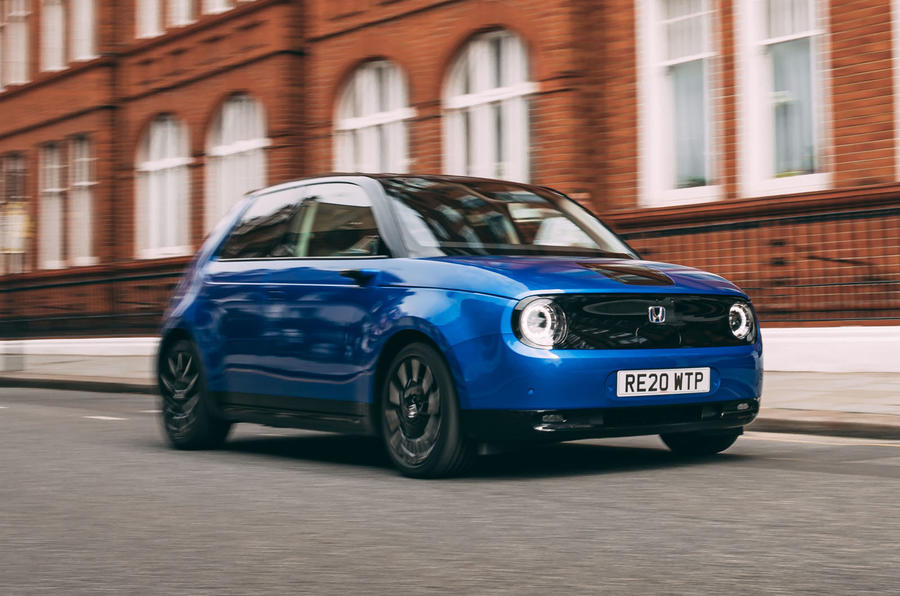Honda has joined Fiat Chrysler Automobiles (FCA) in efforts to avoid EU emissions fines by pooling its fleet with Tesla this year.
Revealed in a European Commission filing from last week, it's the latest company to declare its intent to join together with another manufacturer to help meet the tough 95g/km fleet average CO2 target and avoid hefty fines.
Rules dictate that companies that have earned a high number of emissions credits (supercredits) for selling low-CO2 models, such as EVs, may sell them on to others struggling to meet their CO2 targets. Pooling these credits allows car makers to count their combined fleets as one.
It’s reported that Tesla has made more than $1.4 billion (£1.08bn) between 2016 and 2018 by selling these credits to other US manufacturers. FCA avoided billions in fines by spending hundreds of millions to join Tesla’s EU pool and now Honda is doing the same - although a figure is yet to be disclosed.
The European Commission document suggests that Honda has registered only around 1000 examples of its Honda E electric supermini in Western Europe since it was introduced earlier this year. That figure isn’t enough to generate enough supercredits for Honda to avoid EU fines.
Last week, Ford announced plans to form a CO2 pool with Volvo and Polestar to avoid fines. Toyota and Mazda are expected to do similar, while Renault has opened up its CO2 pool to other manufacturers. Meanwhile, the Volkswagen Group has joined forces with SAIC and its subsidiary, MG.
READ MORE
Inside the industry: how selling emissions credits helps Tesla grow
Renault opens up CO2 emissions pool to help other manufacturers
EU pushes for tougher 2030 CO2 targets for car industry





Join the debate
Add your comment
Paying competitors for EV credits
This whole EU game just Proves what complete drongos the EU bureaucrats are. Why anybody allowed these faceless loops to take over the free trade area and dictate how their version of how everyone should live never ceases to amaze me .
Honda could do it themselves
The Apprentice wrote:
I am sure you are right, but i doubt Honda take Europe too seriously. Their sales here are tiny compared to the rest of the world, where tax incentives to buy PHEVs dont exist. Its presumably cheaper to pay the fines (or give the money to Tesla) than develope cars for our tax system.
The Apprentice wrote:
Cheating the intent
Should not be allowed. Honda and FCA lose the incentive to improve so we all suffer from extra emissions and CO2 and NOX
fellwalker wrote:
Tesla and other start ups receive a cash injection needed to finance new models and replace those car makers that don't get with the program. Some brands like Jaguar have a tremedous opportunity here. If Jaguar can go fully electric for example, they might lose money whilst the market develops but Land Rover will happily prop them up if it means they don't get fined. Meanwhile in JLR's case, Jaguar is developing the components future Land Rover's need. So it's a win win.
They are giving hundreds of
They are giving hundreds of millions of Euros to competitors. I think the incentive to change is big enough!
I can't believe this is what the EU intended. European car manufacturers are subsidising the production of batteries abroad - batteries that require huge amounts of carbon equivalents to make (albeit they then enable emissions free vehicles). This is all wrong. CO2 emissions are still rising globally and this deal might even accelerate that, in the short term at least.
If batteries can be made in a way that doesn't cause so much pollution, then I am all for EVs. But there is an argument here that the legislation is running ahead of the technology and it's causing real harm.
scrap wrote:
EVs have a much smaller lifetime carbon footprint even after factoring in manufacturing emissions. So the #1 priority needs to be converting car buyers from combustion to electric. Legislation around manufacturing will also be helpful, but as cleaning up battery production will have a smaller benefit than switching powertrain types, that's not so high on the priority list.
Nothing is 100%
yet the battery in your phone and laptop etc are fine to make and buy. How about the oil currently being mined and refined in such place as Saudi Arabia.
scrap wrote:
Yeah, not only that but it is anti-competitive because those companies that are giving money to Tesla have less money for their own R&D.
And as you say, it's almost like the EU is giving State Aid - to non-EU manufacturing!
fellwalker wrote:
Co2 ony nothign to do with Nox..
In fact this whole Co2 credit thing is a joke..